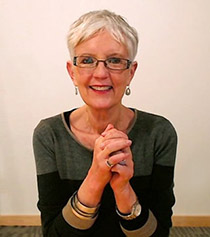Strategies to Treat Patients Trapped in the Freeze Response
 |
with Bessel van der Kolk, MD;
|
 |
with Bessel van der Kolk, MD; Stephen Porges, PhD; Ruth Lanius, MD, PhD; Pat Ogden, PhD; Thema Bryant-Davis, PhD; Bethany Brand, PhD; Deb Dana, LCSW; Janina Fisher, PhD; Kathy Steele, MN, CS; Ruth Buczynski, PhD
Sign up for the Gold Package

This is a learning community for practitioners. We can’t wait to hear what you’re going to use with your clients
But please do NOT:
- seek advice for personal problems
- ask for referrals
- post links or advertise a product
- post about technical problems
As student intern who is just learning, this is invaluable. You’re right, we’re taught to talk, and yet trauma is felt in the body. As a trauma survivor, I resonated with the clinicians here. Instead of being nervous and talking to try to engage a client with a freeze response, I will now as them to look right to left, or stand up and march, or turn their heads…. to get the body involved. I will use the objects in the therapy room more, understanding that for a trauma survivor, expecting them to trust another person is unrealistic, even for a master therapist.
Wow so informative and interesting
I love the way you share your expertise with your colleagues
The way you summarize each section ,makes the webinar very clear and user friendly.
Thanks
Session 1 was amazing. Great examples, clear pathway and structure. I learned so much. I am an emerging Transpersonal Art Therapist, a client centred therapy. Nonetheless, I found many of the strategies outlined in the session, extremely useful. I would be interested in how these techniques could be used in online sessions. I am excited for session 2 tomorrow
This was so informative! Thank you.
That was an amazing session!!
I am so humbled and thankful for this training. While I was watching, one of my clients called me in a panic from the ER with breathing challenges and low oxygen levels. I was able to help her orient in the space, get grounded, slow down her breathing with longer outbreath, let her know I was right there with her, let her know that she is powerful and has tools available to help her, reminded her to stay present, and led her through box breathing 4, 4, 4, 4. Had her imagine a bubble of protection and light around her. Had her repeat to herself, I am safe, I am love, I am protected. There was an almost instant change and relief she experienced. Though I don’t know how things will proceed during the tests they are about to do, I feel like she has some tools to work with that can significantly help her navigate the next few hours. Thank you for this offering. Much of the material being presented is not new to me but there are many good reminders. Warm wishes to all of you who are teaching us as well as all who are watching.
Thank you so much for generously making this valuable knowledge available to new practitioners like myself that are just beginning therapy practice and not yet in a position to register for many trainings. I’m deeply grateful for the learning!
I am in this position too and very grateful for the resources. When I am earning, I will definitely pay for the gold package so I can support others in their learning.
I want to thank you for the occasion I was offered to watch and listen this multiple level lesson.
I’m not a psycho-therapist, I’m a counselor, I’ve been working with fragile young people;
now I’m working with people who come out from human trafficking system, and also with people who come out from labor exploitation.
I’m based in Italy, so in my project we have quite a few experience of people who had this background.
And it’s a very interesting thing form to be able to get to a better comphrension about the state some of them encountered and live in their past migration experiences. It’s a theme that is engaging me, and I really wanted to know more about the process of freezing and its consequence in people daily life. Sometimes for us social operator it’s not easy to read their behaviours because probably they have entered mentally and bodily in different condition. So I consider this an important guide that can indicate me some good practices and some clear views on this phenomen. Thanks a lot, from Milano, Italy, Davide Fossati
This was a really helpful session. Thank you. The strategies used in the session with the client were clear. I am not sure what clients can be helped to do when their trauma experience is triggered OUTSIDE the counselling room. Will that be covered in another session? Thank you. Angela Liddell
This was an excellent discussion of the freeze response. Insightful methods presented. I especially the taking the focus from the memory to the body awareness. This is where liberation can happen. Thank you.
Excellent, so helpful. I have been trying to devise similar strategies on my own and this shows that I am on the right track, plus some new insights. Thank you.
very informative, thank you. looking forward to the next one
This was awesome. Thank you so much for helping many of us understand and put a name on what’s happening in our own lives.
In my watching your wonderful series I am continuing a path that I have been following for many years to gain understanding of my own life. In other words, I am in my case both the practitioner and the patient, or client.
I must at this point make it clear that my sole purpose of writing in your comment box is solely motivated by my eagerness for my experiences help others with any problems similar in any way to my own so that my dreadful life does not go to waste, and possibly also to save the lives of others, which would be the dearest reward that I can imagine.
I am now 73 years old, retired architect and, although it was only in 1976 at age 24 years when suffering a breakdown that I became aware that I had an ‘internal’ problem with myself, I now know that my problem began possibly at age 7 years, and without question at or before age 14 years.
In 2019 I was helped by a psychiatric nurse friend of mine to retrieve suppressed memories from 1973 which thus began to expose an apparent cause of my affliction, following which I soon discovered Mr Kolk’s wonderful book ‘The Body Keeps The Score’ which gave me so much to work on, in terms of my understanding, in my mind, of the neurology of trauma that it took me well over 12 months to work through.
My understanding, although without formal training in any of these areas, is at least advanced enough that I now have understanding from Michael Nehl’s book, ‘The Indoctrinated Brain’, that it seems beyond question that I suffered an event that caused ‘Pre Traumatic Stress’ at age 14 years that more than prepared me to develop Post Traumatic Stress (Syndrome and/or Disorder) at age 20-21, which together subsequently destroyed my life.
By 2018 I thought, mistakenly, that my PTSD had dissolved and cured itself over the years since 1985 the last episode in which I experienced dissociation occurred.
One Sunday in October 2018, while on a business trip to Barcelona, Spain, an event occurred that triggered a response in me causing me to dissociate (or disconnect?), partially lose control of my body, partially lose control of my speech, to lose most clarity and flow in my thinking and thought processes, gave me out-of-body experience, and over the following zombie like hours an apparently diminishing ability to remember things. On the following Saturday I found myself back in England at a business event when someone asked me, “Are you alright?”. It is as if the lady with this question brought me out of a trance, and I spontaneously became, myself. From the previous Sunday to this wakening Saturday I had only a few hours memory from during the intervening week, and that memory was of a meeting with the lady who asked me the question on Friday. To complete the picture, I possibly should mention that at the time of the onset of this episode in Barcelona I was speaking to the same person who asked me the question that, as it were, awakened me.
It seems that I may have been in a “Freeze” state all of this time. I now often feel that the state I was in is like, or may actually be, the same as hypnosis? From ‘The Body Keeps The Score’ I understand that my experience likely results from Dissociation and Autonomic Control spanning from that Sunday in Barcelona, when I returned to the room I was staying in, through the Monday when I must have flown home to Heathrow, London, and then throughout the week after returning home on that Monday, apart from the time I kept the appointment with the lady with whom I was speaking in Barcelona and who also awakened me the following Saturday.
As I watch and assimilate more of your lessons into my experience, I will be more than glad to try to make my case/experience available to you all for the reasons already stated. Not least, I would like very much to take this opportunity of thanking Mr Kolk for ‘The Body Keeps The Score’ without which I could never have progressed nearly so far in my understanding of my condition.
There is always something new to bring home and to session from these generous offers of free webinars. I work prevalently via zoom for several reasons, many to do with the needs of the Client. Even so, I introduce many physical activities during session, from doodling to breathing, tapping-stomping feet, standing up, and more. The nodding-shaking head for yes and no I did a couple of times but had never heard of it being a legitimate part of engagement. I am thankful for the language for introducing it as a process in C’s fearful moment. I needed to be reminded about not looking in C’s eyes! What the brain is doing during Freeze is invaluable to me and sometimes to the client. YES!! the savor stage is so validating and joyful for clients and me! I need to ask that we professionals match the buzz term to the actual fact of what the body wants to do. I always recite “FLight or fightOFF, freeze, flop”. We need to make this shift to help clients step out of shame for not having fought aggressively. Too many of us say Fight-Flight, and then describe the opposite, even in these sessions (Ruth Lanius e.g. but not only) Even Kolk in his book says the Androcratic version of the buzz word (NB weakness is the kryptonite of patriarchal mindset, so will not allow itself to say “run away” first) and then describes the true somatic-behavioral version. #EthicsofCare is the shift we need
Thank you for the quality video and free information. I’m not a psychology practitioner, but understanding the ways to deal with the freeze response is extremely helpful on a personal level and in life in general.
I missed most of this first teaching however what I did receive was very powerful. I will use this, ” it’s about fixing but about the experience wanted” and the fact that in a freeze response words are accessible. I am an energy body worker. I infuse massage, deep tissue, thai, lomi lomi, polarity, cranio-sacral with tuning forks, pacing with somatic active meditation, compassionate therapies, Eft, and more clearing trapped emotions work. I will incorporate the work from these training’s to integrate more safety and connection in my intake intro to the session. I will touch in different ways when the body is speaking in ways in which I am learning from your skilled pioneers here. Thank you tremendously. Valeria en Guatemala~
Hello Valeria,
I,too, have been a teacher in classrooms with super young to super old. Your adding to your training is amazing.
What I wanted say is that during Freeze, words are INaccessible, not accessible. The cognitive conscious part of the brain has shut down. That is why gentle invitation to move the body is the best way possible to hook the conscious mind back up, get it back online.
All the best to you,
Kimble
I´ll use it for my students in business psychology.
And I´ll use it to remind ways out of my own car accident trauma.
I once was so grateful for the book of Peter Levine helping me understand what had happened!
Yours Dr. Eva Nitsche MD
Really interesting, helpful to focus away from the “talking therapy” side of things. I think there is lots here I can share with the people I work with who support children and young people (eg teachers and youth justice workers) as well as with my direct clients.
The only thing that concerns me from what i have listened to so far is that I can anticipate that it could be potentially dangerous for certain clients to be encouraged to allow their body to “complete” a movement impulse that they could not complete at the time due to being in a freeze response (as in hit out at someone – who might be the therapist, or to break or damage something where they could get hurt) and I wondered why this caution wasn’t mentioned.
Or have I misunderstood something?
how do you get the CE’s does it come to my email is there a post test?
I discovered as I was filling the worksheet the mechanism for my hypeeactivity and potential to turn into an addictiıon. My father used to be an angry person in an unpredictable way. I am 56 now and still feel the tension of the young girl in my body. My survival strategy was to be busy, all the time about something and to run everywhere. I understand better why I became a Taichi practitioner as a way to slow myself into presence. Thank you for this uptodate training. I am more aware how freeze response manifests around me. I will be using the material as a basis for tomorrow’s team meeting to promote thei members’ Self understanding and to support our Clients.
Thank you for offering such important knowledge for free. I am licenced psychotherapist and i find really usefull the use of pulse oxymeter and the following relulating breathing exersices. They are very practical indeed. Trauma is “somatic”, not “cogntive”, that is the key to therapy!
yes! thank you for reminding me. I found the idea of the oximeter so useful.
Having paid the $40 for the CE credits truly wasn’t enough! It’s amazing how much I learn each time despite the fact i don’t learn well unless reading the transcript. This must be because of your pointed, step by step approach. Thank you for the opportunity to learn as much as I can financially afford to at this point!
Such great information! I’m realizing I need to give more time to the ‘savor’ phase after finishing the response, and how important it is to keep my chair slightly turned away from the client. I am also curious how to handle avoiding too much face to face on virtual sessions. I will play around with having the screen a little away from be and having my body turned slightly away from the camera.
how do you get this to email to I can see the session rather than on my phone. I can’t control a call coming in could miss content. I would not pay for a program that is setup that way.
I work in a community mental health setting and with trauma survivors who report freeze during the abuse and then moved to aggression and fight responses as they got older. Often my clients judge their responses so it will be very helpful to reframe on how the responses were helpful from their perspective rather than just mine. Many of my clients think they need anger management to deal with is likely trauma responses that serve to protect.
I would love to have a training module(s) for working with children, especially those under 12. I really appreciate the option for both free and paid viewing of this information.
So looking forward to the rest of the sessions in this course. Can already see how helpful it will be with a couple of my current clients. Thanks to all!